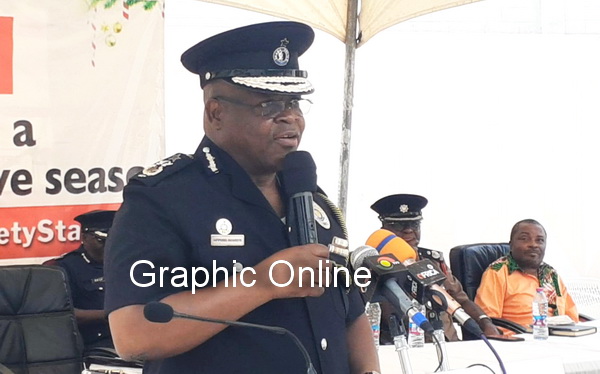
Framework to improve police-media relations launched
A joint framework to improve the relations between the police and the media and further guarantee the safety of journalists has been launched in Accra.
The document, which was put together by the Police Administration and the Media Foundation for West Africa (MFWA), in collaboration with other media organisations, spells out a 12-point action plan to improve media-police relations.
Dubbed: “Framework in police-media relations and safety in Ghana”, the 16-page document outlines complaints settlement mechanisms and procedure for dispensing justice to aggrieved persons.
Additionally, the framework assigns responsibilities to journalists, media organisations, journalists’ professional associations and the police as a measure to curb conflict situations.
The Chief Director of the Ministry of the Interior, Mrs Adelaide Anno-Kumi, who launched the document, described it as a major move that would help strengthen relations between the police and the media.
She urged the partner institutions to be committed to the provisions in the document in the national interest.
Highlight
A former Chairman of the MFWA, Professor Kwame Karikari, who was the consultant for the drafting of the framework, said as part of the recommendations, the Police Service was expected to institute measures to promptly investigate acts of impunity against journalists.
Additionally, he said, the service and media professional organisations were required to set up a committee with the mandate to champion dialogue sessions on the safety of journalists.
Prof. Karikari, who is currently the Chairman of the Board of Directors of the Graphic Communications Group Limited (GCGL), also said the police had been asked to set up a national police-media relations committee to identify and nip potential conflicts in the bud.
“The Ghana Police Service and the media organisations must institute periodic educational events to upgrade and update their knowledge and information on subjects of mutual interest and concern, especially topics on freedom of expression and broad security questions on conflicts and terrorism,” he said.
He underscored the need for the police to deal with journalists within the confines of the law, instead of resorting to excesses.
"The Constitution of Ghana does not allow for censorship of the media, including the seizure of mobile phones, cameras and recording materials from journalists. If a policeman seizes such recording materials from journalists, it amounts to censorship, which is not constitutional," he stressed.
Police committed
For his part, the Inspector General of Police, Mr James Oppong-Boanuh, declared the commitment of the service to the implementation of the framework.
In a speech read on his behalf by the Director-General of Police Administration, Commissioner of Police (COP) Dr George Akuffo Dampare, the IGP said the police would do everything possible to improve on their bilateral relations with the media.
He said accountability was key to building police-media relations, since both institutions had the common goal of promoting national development.
More on the document
Throwing more light on the framework, the Executive Director of the MFWA, Mr Sulemana Braimah, indicated that the document was in response to the frosty relations that emerged between the police and the media over attacks on some journalists.
He described the launch of the framework as timely, especially when Ghana was heading into a general election on December 7, 2020 and required the two institutions to work closely in its interest.
Mainstreaming document
The General Secretary of the GJA, Mr Kofi Yeboah, observed that the launch of the framework was not an end in itself but that there was the need for the document to be properly implemented.
In doing so, he called on the media establishment and the Police Administration to consider mainstreaming the framework into the training of policemen and journalists.
The Netherlands Ambassador to Ghana, Mr Ron Strikker, lauded the two institutions for the initiative and urged them to strengthen their relations.
He said the two institutions needed to work together to end impunity against journalists, since the two were critical to the consolidation of Ghana's democracy.
